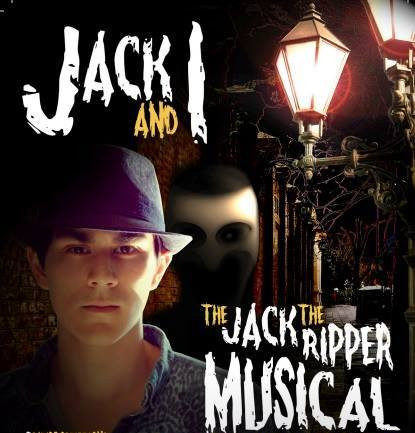
| Latest Reviews |
| Jack & I - DHK Productions It’s every reviewer’s worst nightmare: how do you review a show that deliberately sets out to undermine, not just itself, but the entire genre and everything that has come before it? With their latest show: Jack and I: The Jack the Ripper Musical, DhK Productions have done just that. They are a relatively new company but even at their young age, they are already masters of what they do, and their comedy musicals (or shuld that be parody musicals?) are popular to point of “cult” status. Jack and I tells the story of Inspector Abberline’s (Chris Chalmers) frustrated attempts to catch the notorious Whitechapel murderer, nicknamed Jack the Ripper.
Firstly, a disclaimer. Yes, we at EdCringe were involved with this production. But isn’t that simply a sad indictment on the ludicrous hypocrisy of the importance of reviews at the festival, where anyone can earn rave reviews from some obscure publication (and most do)? The plethora of stars and selected quotes that adorn the really expensive posters for shows, glued all over the city like it’s a cure to Ebola, is a bigger eyesore than the pissed-up student thespians vomiting their not-even-digested sausage rolls into a puddle. By virtue of the sheer volume of reviews that are churned out every day, every show is going to have at least one nugget from a review that they can plaster onto their posters, or shout in my fucking face while I’m trying to cross the street. Not that this review will help anyone either, because the festival ended about four months ago. That reference to Ebola by the way isn’t particularly topical now, nor was it during the Fringe because it hadn’t happened yet, so that’s another reason to discredit this review, and in fact all reviews. But really, when a show goes out of its way to parody multiple genres at once, whilst at the same time remaining aware of itself as a commodity of these ridiculous genres, should we not just give them the benefit of the doubt? What harm is a stupid little review going to do to a troupe whose egos are so inflated that the good reviews are ignored as standard and the bad ones used as a sign that they are ahead of their time? It’s almost as if they deliberately came to the Fringe, where everything is so expensive that it has its own mansion tax (another brilliant topical reference there), with the idea of making a musical – usually associated with being a lavish, decadent, spectacle – with absolutely the lowest production values possible. A functional-bordering-on-crap set, actors doing their own scene changes, and costumes so tatty that one actor thinks nothing of high-kicking his hat into the audience every night. Second disclaimer: we all know musical theatre is shit. To paraphrase Stewart Lee, it’s the sort of shit you get when you combine shit music with shit theatre: a compound shit mixture, a shit composite, a kind of sticky shit syrup. Theatre is supposed to be challenging and engaging. Musicals don’t challenge anything beyond its own moral integrity; you have to surrender your judgement to the spectacle and the flashing lights. But the Jack & I team, mercifully, perhaps accidentally, don’t have the budget for this. The show does challenge the way musicals have been done in the past, particularly Les Miserables, whilst there are also references to classic film noir dramas and to Airplane!, underscoring their tongue-in-cheek approach to the past masters of these genres. What this means is that the focus is pulled onto the actual words and the performances, thankfully, because they are brilliant. Particularly impressive is the way that the cast are able to juggle different types of comedy simultaneously, both committing to and feigning an ironic indifference to the show. Chalmers and his onstage wife Lizzie Camps are tragically believable in depicting the breakdown of their marriage and the man. Sara Basso de Marc is especially delicious in transforming her character from what seems like a cheap writing device (think Tyler Durden meets Drop Dead Fred) to undermine practically everything that happens onstage into something altogether darker, which is pretty much symptomatic of the whole thing. Matt Lim’s comic versatility stitches together the rest of the show with a number of endearing character performances. It’s no secret that Jack the Ripper was never caught, or even identified, but the play decides to use this as a help rather than a hindrance to its resolution, and the way this uncertainty is structured, hinted at, and played with, is rather genius. Theatrical and comedic brilliance in its purest, most unashamed form. And there you go guys; you can have that for your fucking posters. |
| Paul Richards: Getting Lost In My Hometown - Paul Richards Paul Richards has a Tesco Value boom box. He uses it in his show to play background music. A lot. He’ll often press play, say half a sentence and then stop the boom box, finish his sentence, and then press play again. He does this many, many times. The despair in the room escalates with every passing push of the pause button. At one point the CD starts skipping. “It’s not meant to do that” Paul nervously chuckles. I consider eating my hand.
This show needs a tech guy. It so, so badly needs a tech guy. Or maybe it shouldn't have any tech. Maybe Paul Richards should just tell his incredibly dull story free of inappropriately moody piano tracks and poorly conceived sound cues. His alternative to a PowerPoint is a ring binder he flips through. He tries to do a tech failure joke involving Phil Collins. It makes no sense. He does it as a callback later. It remains equally baffling. At one point Paul gets a crappy toy keyboard on stage and plays a song called “Grace Face”. This is the chorus: Grace, Grace, Grace, Grace, Grace, Grace. We are expected to sing along. He then does the same song with a hip hop back beat. This is the highlight of the show as I collapsed into my hands and bellowed with laughter. It was either that or cry. This show exemplifies delusion. Paul Richards assures us he has toured this show up and down the country. One can only hope he loses it in Edinburgh. Not that fun to watch. Definitely awful and inspired a moment of lucid hysteria but sadly more pain than pleasure. |
| A Body To Die(t) For - TKD Productions This bold musical encompasses the entirety of modern life (conniving politicians, celebrity culture, dysfunctional families), along with those little extras that make life worth living, and this show worth seeing. Teenager Greta just wants a normal life without being clumsily sexually assaulted by her stepfather, but is forced to run away from home. Like so many of those living on the streets, she loses so much weight that she gains super-stardom as a model. If only life remained that simple. Her well-meaning spaniel of a boyfriend gets her tangled up in a Byzantine plot of body liberation terrorists and the fast food industry, while Greta becomes nothing more than a pawn in a game between closet homosexual politicians, fat terrorists and a sex witch. As we see Greta acted out by actors of varying girth, we are led to understand that the 2-dimensional cardboard cut out props that populate this world (a cake, telephone, candle, bomb, and cat) are themselves a metaphor for something. Our attitudes to weight change as frequently as the limp of the mad German scientist who turns up sometimes. Musically, this piece is hard to fault. Nearly a year on I sometimes start yelling the chorus of “I Can't Be Tamed” while I raid the fridge. If this show ever returns, then you simply must come and see it. But first: sex.
|
| Latest News |
| Shakespeare at the Fringe Regardless of how it’s done, you can guarantee Shakespeare will be dragged up to the Fringe year after year. I’ve just leafed through (read: examined thoroughly) the Fringe guide for this summer and I spotted 56 takes on the Bard. Now I’m not any fancy mathematician but that works out as almost two Shakespeares for every day of the Fringe, including no less than 11 interpretations of Hamlet.
I’ve learnt to be wary of these productions. Too many times have people said to steer clear of Will at the Fringe, and in the spirit of the Festival Fringe it is preferable to see more, well, “fringe” plays instead of the most canon dick jokes can get. But last year, the Bunker Trilogy’s magnificent Macbeth was selling out left right and centre- they surely must have been doing something right. I wouldn’t know, because I couldn’t get hold of a ticket, but I did see the next best thing. Much a Shoo-Be-Doo About Nothing had a promising premise. 50s Sicily, mafia, Rat Pack crooning. The end result was much less Rat Pack and more rat puppet. This isn’t a turn of phrase: there was an actual puppet serving as the sidekick for Dogberry. Did Dogberry originally have a sidekick? Did he need one? Did somebody’s mum just make a puppet for the production and they didn’t have the heart to tell her they didn’t need it? I don’t know which animal it was meant to be, and I don’t know why. Did it improve Shakespeare? Well, it certainly improved this, somehow. I can’t remember any of the actors’ faces very clearly, but I still remember the puppet as vividly as the first time I had whispered “what the hell is that”. I think the puppet saved the day or brought Hero back to life or something? It sure beat watching the ensemble do the same two dance moves over and over whilst they bemusedly sang That’s Amoré. I can only hope, that with 56 Shakespeares this year, at least one of them has a puppet. A solid three stars for you, Dogsberry’s little furry…ferret? |
Got a suggestion for a review?
You know the kind of show.
You know the kind of show.
Fancy your hand at writing?
You're in luck! And so are we!
We very much need more reviewers to help us search out the true best of the fringe. No experience is required, just ideally a good sence of humor and that you don't take life too seriously. If interested, please email us at editors@edcringe.com.
You're in luck! And so are we!
We very much need more reviewers to help us search out the true best of the fringe. No experience is required, just ideally a good sence of humor and that you don't take life too seriously. If interested, please email us at editors@edcringe.com.
Comedy, is it right for you?
Probably not, so move on please.
Probably not, so move on please.




